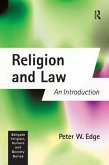- Broschiertes Buch
- Merkliste
- Auf die Merkliste
- Bewerten Bewerten
- Teilen
- Produkt teilen
- Produkterinnerung
- Produkterinnerung
Comparing Religions Through Law offers a ground- breaking study which compares these two religions through shared dominant structures. In the case of Judaism and Islam the dominant structure is law. Comparing Religions Through Law presents an innovative and sometimes controversial study of the comparisons and contrasts between the two religions and offers an example of how comparative religious studies can provide grounds for mutual understanding.
Andere Kunden interessierten sich auch für
![The Grounds of Christianity Examined by Comparing The New Testament with the Old The Grounds of Christianity Examined by Comparing The New Testament with the Old]() George Bethune EnglishThe Grounds of Christianity Examined by Comparing The New Testament with the Old18,99 €
George Bethune EnglishThe Grounds of Christianity Examined by Comparing The New Testament with the Old18,99 €![Who Do You Say I Am? Comparing Your Jesus to the Christ of the Bible Who Do You Say I Am? Comparing Your Jesus to the Christ of the Bible]() Rick AllenWho Do You Say I Am? Comparing Your Jesus to the Christ of the Bible25,99 €
Rick AllenWho Do You Say I Am? Comparing Your Jesus to the Christ of the Bible25,99 €![Contemporary Religions in China Contemporary Religions in China]() Shawn ArthurContemporary Religions in China51,99 €
Shawn ArthurContemporary Religions in China51,99 €![Religion and Law Religion and Law]() Peter W. EdgeReligion and Law58,99 €
Peter W. EdgeReligion and Law58,99 €![The History of Evil in the Eighteenth and Nineteenth Centuries The History of Evil in the Eighteenth and Nineteenth Centuries]() Douglas HedleyThe History of Evil in the Eighteenth and Nineteenth Centuries58,99 €
Douglas HedleyThe History of Evil in the Eighteenth and Nineteenth Centuries58,99 €![Japanese Religions and Globalization Japanese Religions and Globalization]() Ugo DessìJapanese Religions and Globalization55,99 €
Ugo DessìJapanese Religions and Globalization55,99 €![After World Religions After World Religions]() Christopher R CotterAfter World Religions53,99 €
Christopher R CotterAfter World Religions53,99 €-
-
-
Comparing Religions Through Law offers a ground- breaking study which compares these two religions through shared dominant structures. In the case of Judaism and Islam the dominant structure is law. Comparing Religions Through Law presents an innovative and sometimes controversial study of the comparisons and contrasts between the two religions and offers an example of how comparative religious studies can provide grounds for mutual understanding.
Produktdetails
- Produktdetails
- Verlag: Routledge
- Seitenzahl: 276
- Erscheinungstermin: 24. Juni 1999
- Englisch
- Abmessung: 234mm x 156mm x 15mm
- Gewicht: 424g
- ISBN-13: 9780415194877
- ISBN-10: 0415194873
- Artikelnr.: 21419645
- Herstellerkennzeichnung
- Libri GmbH
- Europaallee 1
- 36244 Bad Hersfeld
- gpsr@libri.de
- Verlag: Routledge
- Seitenzahl: 276
- Erscheinungstermin: 24. Juni 1999
- Englisch
- Abmessung: 234mm x 156mm x 15mm
- Gewicht: 424g
- ISBN-13: 9780415194877
- ISBN-10: 0415194873
- Artikelnr.: 21419645
- Herstellerkennzeichnung
- Libri GmbH
- Europaallee 1
- 36244 Bad Hersfeld
- gpsr@libri.de
Tamara Sonn is Professor of Religious Studies at the University of South Florida, specialising in Islam. Her publications include Interpreting Islam: Bandali Jawzis Islamic Intellectual History. Jacob Neusner is Distinguished Research Professor of Religious Studies at the University of South Florida and Professor of Religion at Bard College, New York. He is the author of numerous publications, the most recent being The Intellectual Foundations of Christian and Jewish Discourse.
Preface I. Comparing Islam and Judaism in Particular. A. Why Compare
Religions and Why Compare their Laws? B. The Nonotheist Religions, Judaism,
Christianity, Islam C. Which Judaism, Which Islam, and Why? D. Category
Formations: Comparing Incomparables 1. Shared Structure 2. Shared
Disproportionate Categories a. Where They Say Much the Same Thing about the
Same Topic b. Where They Say Different Things about the Same Topic 3.
Unique Categories: Areas Where They Do Not Intersect II. The Authoritative
Documents of Judaism and Islam A. Where Do We Look for the Law? B. The
Written Torah and the Oral Torah: Scripture, the Mishnah and the Talmuds 1.
Scripture: The Written Torah 2. Mishnah: The Oral Torah 3. The Talmuds C.
Islamic Counterparts 1. Scripture: The Qur'an 2. Tradition: The Sunna 3.
Fiqh D. Conclusions III. The Intellectual Sources of the Law A. How Do the
Authorities of the Law Reason? B. Islam: Consensus, Reasoning, Exceptions
1. Consensus (Ijma') 2. Reasoning (ijtihad) 3. Exceptions C. Judaic
Counterparts: Exegesis, Logic, Argument, Dialectics 1. Exegesis: Midrash
Halakhah 2. The Mishnah's Applied Logic of Hierarchical Classification 3.
The Argument of Analogy and Contrast 4. The Talmud's Dialectics D.
Conclusions IV. The Working of the Law: Institutions A. Institutional
Authority B. The Israelite Court in the Legal Narrative of Islam 1.
Legitimacy 2. Courts' Jurisdiction 3. Evidence 4. Punishments D.
Conclusions V. The Working of the Law: Personnel A. Bases of Authority B.
Islam 1. Legal Scholars (Fuqaha') 2. Judges 3. Muftis C.Judaism: The sage
D. Conclusions VI. Disproportions A. Temple Law and Sacrifice 1. Temple Law
and Sacrifice in Judaism 2. Sacrifice in Islam B. Slave Laws in Islam and
Judaism 1. Slave Laws in Islam 2. Slave Laws in Judaism C. Sacred
Time/Sabbath in Judaism and Sacred Time/Pilgrimage Islam 1. Judaism: Sacred
Time/Sabbath 2. Islam: Sacred Time/Pilgrimage D. Conclusions VII. Unique
Categories A. The Unique Category B. Enlandisement (Judaism) C. Jihad
(Islam) D. The Sage and Torah Study in Judaism E. Khilafah and the Legal
Scholars in Islam F. History, Time, and Paradigm in Judaism G. History in
Islam VIII. Epilogue A. Comparisons Up Close B. Judaism and Islam:
Comparisons in the Context of World Religions Index
Religions and Why Compare their Laws? B. The Nonotheist Religions, Judaism,
Christianity, Islam C. Which Judaism, Which Islam, and Why? D. Category
Formations: Comparing Incomparables 1. Shared Structure 2. Shared
Disproportionate Categories a. Where They Say Much the Same Thing about the
Same Topic b. Where They Say Different Things about the Same Topic 3.
Unique Categories: Areas Where They Do Not Intersect II. The Authoritative
Documents of Judaism and Islam A. Where Do We Look for the Law? B. The
Written Torah and the Oral Torah: Scripture, the Mishnah and the Talmuds 1.
Scripture: The Written Torah 2. Mishnah: The Oral Torah 3. The Talmuds C.
Islamic Counterparts 1. Scripture: The Qur'an 2. Tradition: The Sunna 3.
Fiqh D. Conclusions III. The Intellectual Sources of the Law A. How Do the
Authorities of the Law Reason? B. Islam: Consensus, Reasoning, Exceptions
1. Consensus (Ijma') 2. Reasoning (ijtihad) 3. Exceptions C. Judaic
Counterparts: Exegesis, Logic, Argument, Dialectics 1. Exegesis: Midrash
Halakhah 2. The Mishnah's Applied Logic of Hierarchical Classification 3.
The Argument of Analogy and Contrast 4. The Talmud's Dialectics D.
Conclusions IV. The Working of the Law: Institutions A. Institutional
Authority B. The Israelite Court in the Legal Narrative of Islam 1.
Legitimacy 2. Courts' Jurisdiction 3. Evidence 4. Punishments D.
Conclusions V. The Working of the Law: Personnel A. Bases of Authority B.
Islam 1. Legal Scholars (Fuqaha') 2. Judges 3. Muftis C.Judaism: The sage
D. Conclusions VI. Disproportions A. Temple Law and Sacrifice 1. Temple Law
and Sacrifice in Judaism 2. Sacrifice in Islam B. Slave Laws in Islam and
Judaism 1. Slave Laws in Islam 2. Slave Laws in Judaism C. Sacred
Time/Sabbath in Judaism and Sacred Time/Pilgrimage Islam 1. Judaism: Sacred
Time/Sabbath 2. Islam: Sacred Time/Pilgrimage D. Conclusions VII. Unique
Categories A. The Unique Category B. Enlandisement (Judaism) C. Jihad
(Islam) D. The Sage and Torah Study in Judaism E. Khilafah and the Legal
Scholars in Islam F. History, Time, and Paradigm in Judaism G. History in
Islam VIII. Epilogue A. Comparisons Up Close B. Judaism and Islam:
Comparisons in the Context of World Religions Index
Preface I. Comparing Islam and Judaism in Particular. A. Why Compare
Religions and Why Compare their Laws? B. The Nonotheist Religions, Judaism,
Christianity, Islam C. Which Judaism, Which Islam, and Why? D. Category
Formations: Comparing Incomparables 1. Shared Structure 2. Shared
Disproportionate Categories a. Where They Say Much the Same Thing about the
Same Topic b. Where They Say Different Things about the Same Topic 3.
Unique Categories: Areas Where They Do Not Intersect II. The Authoritative
Documents of Judaism and Islam A. Where Do We Look for the Law? B. The
Written Torah and the Oral Torah: Scripture, the Mishnah and the Talmuds 1.
Scripture: The Written Torah 2. Mishnah: The Oral Torah 3. The Talmuds C.
Islamic Counterparts 1. Scripture: The Qur'an 2. Tradition: The Sunna 3.
Fiqh D. Conclusions III. The Intellectual Sources of the Law A. How Do the
Authorities of the Law Reason? B. Islam: Consensus, Reasoning, Exceptions
1. Consensus (Ijma') 2. Reasoning (ijtihad) 3. Exceptions C. Judaic
Counterparts: Exegesis, Logic, Argument, Dialectics 1. Exegesis: Midrash
Halakhah 2. The Mishnah's Applied Logic of Hierarchical Classification 3.
The Argument of Analogy and Contrast 4. The Talmud's Dialectics D.
Conclusions IV. The Working of the Law: Institutions A. Institutional
Authority B. The Israelite Court in the Legal Narrative of Islam 1.
Legitimacy 2. Courts' Jurisdiction 3. Evidence 4. Punishments D.
Conclusions V. The Working of the Law: Personnel A. Bases of Authority B.
Islam 1. Legal Scholars (Fuqaha') 2. Judges 3. Muftis C.Judaism: The sage
D. Conclusions VI. Disproportions A. Temple Law and Sacrifice 1. Temple Law
and Sacrifice in Judaism 2. Sacrifice in Islam B. Slave Laws in Islam and
Judaism 1. Slave Laws in Islam 2. Slave Laws in Judaism C. Sacred
Time/Sabbath in Judaism and Sacred Time/Pilgrimage Islam 1. Judaism: Sacred
Time/Sabbath 2. Islam: Sacred Time/Pilgrimage D. Conclusions VII. Unique
Categories A. The Unique Category B. Enlandisement (Judaism) C. Jihad
(Islam) D. The Sage and Torah Study in Judaism E. Khilafah and the Legal
Scholars in Islam F. History, Time, and Paradigm in Judaism G. History in
Islam VIII. Epilogue A. Comparisons Up Close B. Judaism and Islam:
Comparisons in the Context of World Religions Index
Religions and Why Compare their Laws? B. The Nonotheist Religions, Judaism,
Christianity, Islam C. Which Judaism, Which Islam, and Why? D. Category
Formations: Comparing Incomparables 1. Shared Structure 2. Shared
Disproportionate Categories a. Where They Say Much the Same Thing about the
Same Topic b. Where They Say Different Things about the Same Topic 3.
Unique Categories: Areas Where They Do Not Intersect II. The Authoritative
Documents of Judaism and Islam A. Where Do We Look for the Law? B. The
Written Torah and the Oral Torah: Scripture, the Mishnah and the Talmuds 1.
Scripture: The Written Torah 2. Mishnah: The Oral Torah 3. The Talmuds C.
Islamic Counterparts 1. Scripture: The Qur'an 2. Tradition: The Sunna 3.
Fiqh D. Conclusions III. The Intellectual Sources of the Law A. How Do the
Authorities of the Law Reason? B. Islam: Consensus, Reasoning, Exceptions
1. Consensus (Ijma') 2. Reasoning (ijtihad) 3. Exceptions C. Judaic
Counterparts: Exegesis, Logic, Argument, Dialectics 1. Exegesis: Midrash
Halakhah 2. The Mishnah's Applied Logic of Hierarchical Classification 3.
The Argument of Analogy and Contrast 4. The Talmud's Dialectics D.
Conclusions IV. The Working of the Law: Institutions A. Institutional
Authority B. The Israelite Court in the Legal Narrative of Islam 1.
Legitimacy 2. Courts' Jurisdiction 3. Evidence 4. Punishments D.
Conclusions V. The Working of the Law: Personnel A. Bases of Authority B.
Islam 1. Legal Scholars (Fuqaha') 2. Judges 3. Muftis C.Judaism: The sage
D. Conclusions VI. Disproportions A. Temple Law and Sacrifice 1. Temple Law
and Sacrifice in Judaism 2. Sacrifice in Islam B. Slave Laws in Islam and
Judaism 1. Slave Laws in Islam 2. Slave Laws in Judaism C. Sacred
Time/Sabbath in Judaism and Sacred Time/Pilgrimage Islam 1. Judaism: Sacred
Time/Sabbath 2. Islam: Sacred Time/Pilgrimage D. Conclusions VII. Unique
Categories A. The Unique Category B. Enlandisement (Judaism) C. Jihad
(Islam) D. The Sage and Torah Study in Judaism E. Khilafah and the Legal
Scholars in Islam F. History, Time, and Paradigm in Judaism G. History in
Islam VIII. Epilogue A. Comparisons Up Close B. Judaism and Islam:
Comparisons in the Context of World Religions Index









